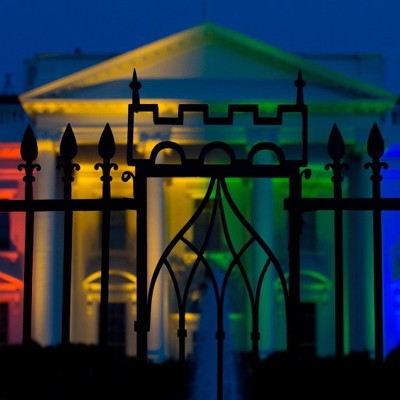
For the first time, the federal government will use a formal framework to ensure improved data collection to better serve U.S. LGBTQI+ communities.
The Biden-Harris administration released its Federal Evidence Agenda on Lesbian, Gay, Bisexual, Transgender, Queer and Intersex (LGBTQI+) Equity roadmap on Tuesday afternoon to help federal agencies collect accurate data and evidence reflecting the needs of the historically underserved communities, Nextgov has learned.
“The hope is that this evidence agenda will help point the way toward agencies across [the] federal government collecting and using this data from external sources,” Meghan Maury, a senior policy advisor for data science at the White House Office of Science and Technology Policy, told Nextgov.
Critical provisions within the new Evidence Agenda include releasing a wide-ranging survey on LGBTQI+ households within the Census Bureau’s Pulse Survey to spotlight disparities these communities face, adding relevant demographic questions to the Census Bureau’s American Community Survey, and releasing a consensus study from the Department of Health and Human Services that gauges sexual orientation and gender identity data to better inform research efforts.
“The Evidence Agenda released today highlights the opportunities to advance LGBTQI+ equity that increased federal data collection and evidence building would create, and provides a roadmap to guide these efforts,” the agenda’s press release reads. “Grounded in evidence, the agenda builds on and continues work taking place across federal agencies and integrates knowledge and expertise from numerous community leaders and technical experts both inside and outside the U.S. government.”
Developed by the Sexual Orientation, Gender Identity, and Variations in Sex Characteristics Data Subcommittee, the agenda responds to calls for a better quantitative window into the LGBTQI+ community. This new framework builds on President Joe Biden’s earlier executive order promising to advance LGBTQI+ equality across several societal corners.
While there are 11 federal surveys currently in circulation that work to collect data on sexual orientation, the Evidence Agenda will work to prioritize expanding the quality of the LGBTQI+ data collected by agencies, as well as normalizing the interoperability of this data to make it more actionable across multiple federal policies.
Maury noted that, of the 11 federal surveys that work to capture data on the nation’s LGBTQI+ population, the Department of Health and Human Services issues the majority of these questionnaires. The Evidence Agenda looks to increase the scope of such surveys to include more detail on potential economic disparities, like housing and food insecurity.
“People are eager to see themselves represented in the data. And even more than that, they’re eager to see the data put to action to serve the LGBTQI community. If we can’t…measure the disparities that are faced by LGBTQI people, it’s really difficult to interrupt them or to create policy solutions that will help serve that community,” Maury said.
Data protection was a guiding principle in cultivating the Evidence Agenda. Maury said that existing federal privacy protections, particularly Titles 13 and 26 in the U.S. Code, will guide cybersecurity practices in LGBTQI+ data protection.
“We want to make sure that we are being thoughtful about privacy and security when it comes to these data,” Maury said. “Our focus is mostly on helping agencies prioritize how to move forward most effectively.”







